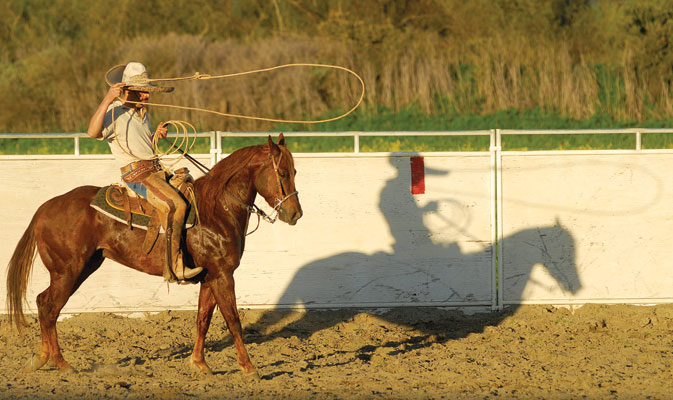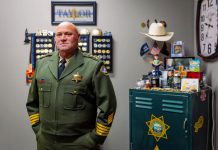
A proposal to direct Santa Clara County Counsel Ann Ravel to
draft an ordinance banning rodeos and circuses on all county-owned
property effective Jan. 1 was unanimously denied Tuesday morning by
the board of supervisors.
A proposal to direct Santa Clara County Counsel Ann Ravel to draft an ordinance banning rodeos and circuses on all county-owned property effective Jan. 1 was unanimously denied Tuesday morning by the board of supervisors.
County staff is preparing a report for the supervisors, likely to be ready in the fall, to give them more information on rodeos and circuses after the issue of animal cruelty was brought to the board.
Supervisor Don Gage said he believed that an ordinance such as the one proposed would lead to “a slippery slope.”
“If you ban rodeos and circuses, how about dog shows, cat shows,” he said. “There are some people who don’t agree with those. How about FFA, when they show their animals …”
The issue came up Tuesday to the consternation of several of Supervisors Liz Kniss and Blanca Alvarado, who said they had concerns about the process. Kniss said it is important that supervisors hear what the public had to say, and in this instance, those concerned about the issue were not there to give their opinions.
Rodeos and circuses came before the county board Feb. 12 when the board voted 3-2 to draft an ordinance specifically targeting two Mexican -style rodeo exercises, “steer tailing” and “horse tripping” in unincorporated parts of the county.
Steer tailing is done when a rider on a horse approaches the animal, then tries to bring it down by wrapping its tail around its leg. Horse tripping happens when a a rider throws a rope around a horse’s legs causing the animal to fall. Both practices have been banned in Alameda and Contra Costa counties for more than a decade.
In February county officials were reacting to complaints about events at Rancho Grande on Condit Road at East Main Avenue in Morgan Hill and other areas in the county – incorporated and unincorporated – and the board voted to conduct a study that would give supervisors more information about rodeos and circuses.
Kniss said she was not comfortable voting to direct counsel to draft an ordinance banning all rodeos and circuses on county property without hearing the staff report, which was expected to be completed in the fall.
She said that one of the things she had learned in the discussions is that “not all rodeos are created equal, not all circuses are created equal.”
County Executive Pete Kutras told supervisors that the county has taken several steps to monitor rodeos and circuses held on county-owned property.
Following the board’s last discussion, all agreements were amended, he said, to include that a veterinarian be present during all the events and that the events are open to an unannounced inspection of the activity by county agricultural officials.
He said he was concerned an ordinance such as the one proposed would lead to the events being moved off county property to other unincorporated areas where the safeguards the county has imposed would not be enforced.
San Juan Bautista resident Martin Marquez, president of the Asociacion de Charros El Herradero de San Martin, said he was distressed to learn that the board had had the discussion about the ordinance.
“I didn’t know anything about it, I think that’s really tricky,” he said. “I don’t think that’s right. If they want to pass the law, people need to know about it, especially those of us who are affected by it. We need an opportunity to come and speak to them about it.”
Marquez said even though the discussion was not about actually passing the ordinance but about directing the county’s attorney to draft an ordinance he would have liked to be at the meeting to comment. He also said he would like the supervisors to actually attend a Mexican-style rodeo event which in Spanish is called “charreria” to see for themselves what goes on there before they ban them wholesale.
“How can you judge if you don’t know, if you’ve never been,” he said. “Do they know the ropes we use are made out of grass, so they break if they are pulled to hard? They are welcome at any time to come and see what (the event) actually is, how beautiful it is with all the families, all the children.”










Rodeos and charreadas are the most violent, brutal and cruel events were the animals forced to participate, endure horrendous treatments. Animals in these barbaric events suffer broken necks, broken legs, broken ribs, bruising throughout their extremities, body and head, lacerations, etc. Many animals are even killed and all for the sake of amusement for idiots! These type of events ought to be abolished entirely. The men and women who participate in these savagery, always use culture and tradition as the pretext to continuing the barbarism. They alway lie and cover up the cruelties associated with it and all lack empathy or compassion. I have seen and witnessed too many of these poor animals being brutalized by these cowards and simply there is no reason for continuing to condone the brutality. Rodeos and charreadas are simply contests of cowards.
Instead of putting a picture of a macho man on horse back with a lazo, glorifying these cowards, a picture of one of the many thousands that are killed and injured by these calow men is more appropriate!